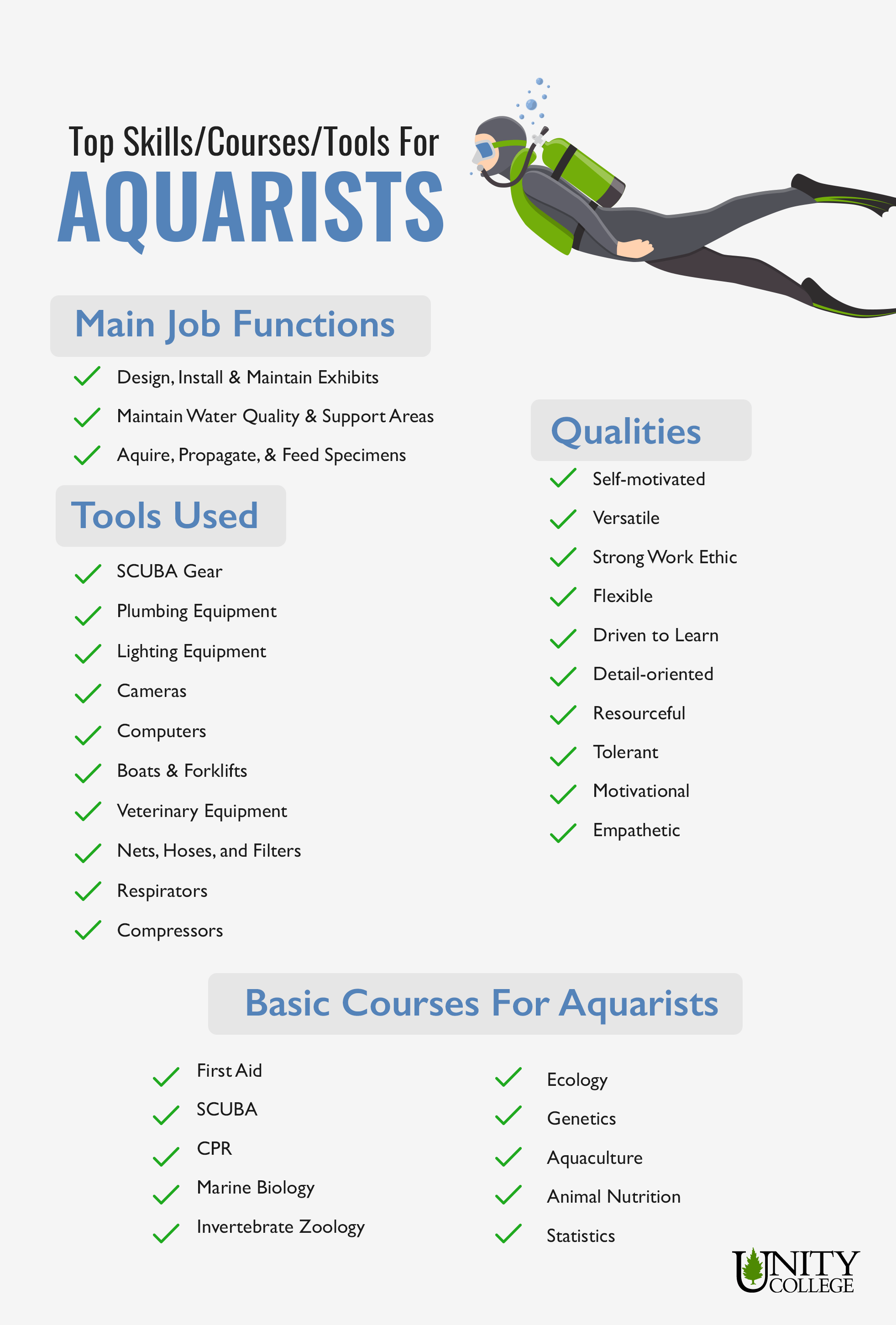Originally posted on May 19, 2023 @ 6:00 pm
Last Updated on 4 weeks by admin
Are you passionate about marine life and dream of working at an aquarium? If so, you may be wondering what kind of degree you need to make that dream a reality. While there is no one-size-fits-all answer, there are several paths you can take to work in this exciting field.
First and foremost, most aquariums require a degree in a relevant field such as marine biology, zoology, or environmental science. However, experience with animal care and training, as well as strong communication and teamwork skills, can also be valuable assets in this field. So, let’s explore the educational and experiential requirements for working at an aquarium and discover how you can turn your passion for marine life into a fulfilling career.
Working at an aquarium typically requires a degree in marine biology, zoology, or a related field. Some positions may require a more specialized degree, such as a degree in veterinary medicine or a degree in business management. However, experience and passion for marine life can also be valuable assets in securing a job at an aquarium.

What Degree Do You Need to Work at an Aquarium?
If you love marine life and aquatic animals, you may have considered working at an aquarium. Aquariums offer a wide range of job opportunities, from animal care and exhibit design to education and conservation. But what degree do you need to work at an aquarium? Here’s what you need to know.
1. Marine Biology
If you want to work closely with the animals and their habitats, a degree in marine biology is a great place to start. Marine biology degrees cover topics such as oceanography, marine ecology, and marine conservation. With a degree in marine biology, you can work as an aquarist, animal trainer, or exhibit designer.
To become a marine biologist, you typically need a bachelor’s or master’s degree in marine biology or a related field. Some aquariums require a Ph.D. for certain positions, such as research scientists.
2. Environmental Science
Environmental science is another degree that can lead to a career at an aquarium. Environmental science degrees cover topics such as ecology, environmental policy, and sustainability. With a degree in environmental science, you can work in animal care, exhibit design, or education.
To become an environmental scientist, you typically need a bachelor’s or master’s degree in environmental science or a related field. Some aquariums require a Ph.D. for certain positions, such as conservation scientists.
3. Zoology
Zoology is the study of animal life, and a degree in zoology can be useful for working at an aquarium. Zoology degrees cover topics such as animal behavior, physiology, and evolution. With a degree in zoology, you can work as an aquarist, animal trainer, or exhibit designer.
To become a zoologist, you typically need a bachelor’s or master’s degree in zoology or a related field. Some aquariums require a Ph.D. for certain positions, such as research scientists.
4. Marine Engineering
Marine engineering degrees focus on the design and construction of structures and equipment used in marine environments. With a degree in marine engineering, you can work as an exhibit designer or in aquarium maintenance.
To become a marine engineer, you typically need a bachelor’s or master’s degree in marine engineering or a related field.
5. Education
Aquariums also need educators to teach visitors about marine life and conservation. A degree in education can be useful for working in aquarium education programs.
To become an aquarium educator, you typically need a bachelor’s or master’s degree in education or a related field.
6. Business
Aquariums are not just about animals and education—they are also businesses. Business degrees can be useful for working in aquarium management, marketing, or fundraising.
To work in aquarium management or marketing, you typically need a bachelor’s or master’s degree in business administration or a related field. To work in aquarium fundraising, a degree in nonprofit management or fundraising may be helpful.
7. Communications
Aquariums need to communicate with visitors, donors, and the media. A degree in communications can be useful for working in aquarium public relations or marketing.
To work in aquarium public relations or marketing, you typically need a bachelor’s or master’s degree in communications or a related field.
8. Veterinary Medicine
Aquarium animals need medical care just like any other animal. A degree in veterinary medicine can be useful for working as an aquarium veterinarian.
To become an aquarium veterinarian, you typically need a doctor of veterinary medicine (DVM) degree and a state license. Some aquariums may also require additional training or certification.
9. Marine Science
Marine science degrees cover a broad range of topics related to marine life and environments. With a degree in marine science, you can work in animal care, exhibit design, education, or conservation.
To become a marine scientist, you typically need a bachelor’s or master’s degree in marine science or a related field. Some aquariums require a Ph.D. for certain positions, such as research scientists.
10. Fisheries and Wildlife
Fisheries and wildlife degrees focus on the management and conservation of fish and wildlife populations. With a degree in fisheries and wildlife, you can work in animal care, exhibit design, education, or conservation.
To become a fisheries and wildlife biologist, you typically need a bachelor’s or master’s degree in fisheries and wildlife or a related field. Some aquariums require a Ph.D. for certain positions, such as research scientists.
In conclusion, aquariums offer a wide range of job opportunities for people with different backgrounds and interests. Whether you’re passionate about marine biology, education, or business, there’s a job for you at an aquarium. So, go ahead and pursue your dream job at an aquarium!
Frequently Asked Questions
If you love aquatic animals and want to work at an aquarium, you may be wondering what degree you need. Here are some commonly asked questions and their answers to help guide you in your career path.
What degree do you need to work at an aquarium?
While there is no specific degree required to work at an aquarium, most employers prefer candidates with a degree in marine biology, zoology, or a related field. These degrees provide a strong foundation in the biological and ecological principles of aquatic animals, which is crucial for working in an aquarium.
Additionally, experience working with animals or in an aquarium setting can also be beneficial. Many aquariums offer internships or volunteer opportunities to gain hands-on experience and increase your chances of getting hired.
What kind of jobs are available at an aquarium?
There are a variety of jobs available at an aquarium, ranging from animal care and husbandry to education and outreach. Some common positions include aquarists, who are responsible for the care and feeding of the animals, educators, who teach the public about aquatic ecosystems, and researchers, who conduct scientific studies on marine life.
Other positions may include exhibit designers, marketing and public relations specialists, and facility maintenance and operations staff. Depending on your interests and skills, there may be a variety of jobs available to you at an aquarium.
What skills are important for working at an aquarium?
Working at an aquarium requires a variety of skills, including strong communication and interpersonal skills, attention to detail, and a passion for aquatic animals. Additionally, many positions may require physical strength and stamina, as tasks such as carrying heavy equipment or working in water can be physically demanding.
Other important skills may include problem-solving abilities, critical thinking skills, and the ability to work well in a team. If you are interested in working at an aquarium, it is important to develop and highlight these skills in your resume and during interviews.
What are some challenges of working at an aquarium?
While working at an aquarium can be rewarding, there are also some challenges to consider. For example, working with animals can be unpredictable, and there may be situations where the animals are stressed or ill, which can be emotionally difficult to handle.
Additionally, working in an aquarium often requires irregular hours, including early mornings, late nights, and weekends. There may also be physical challenges, such as working in wet or humid conditions, or working with heavy equipment. If you are considering a career at an aquarium, it is important to be aware of these challenges and be prepared to handle them.
What are some tips for getting a job at an aquarium?
If you are interested in working at an aquarium, there are several steps you can take to increase your chances of getting hired. First, consider getting a degree in a related field, such as marine biology or zoology. Additionally, gaining experience through internships or volunteer work can be beneficial.
Networking with professionals in the field and attending industry events can also help you make connections and learn about job opportunities. Finally, be sure to tailor your resume and cover letter to the specific job you are applying for, highlighting your relevant skills and experience.

Ask the Aquarium — “How can I get a job at an aquarium or zoo?”
In conclusion, if you are interested in working at an aquarium, there are a variety of degree options that can help you achieve your goals. A degree in marine biology, zoology, environmental science, or a related field can provide a strong foundation of knowledge and skills necessary for a career in aquariums.
It is important to note that while a degree is important, gaining practical experience through internships or entry-level positions can also be valuable. This can provide hands-on experience with aquatic animals and the day-to-day operations of an aquarium.
Ultimately, the specific degree requirements for a job at an aquarium will depend on the position and the institution. It is important to research the job requirements and qualifications for your desired position to ensure that you are on the right path towards a fulfilling career in the aquarium industry.
